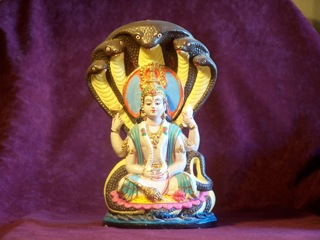

Distortion of Scriptures
Introduction
Love in the Krishna Book
Teachings of Queen Kunti
Lessons from the Bhagavad-gita
Introduction: How False Gurus Interpreted the Scriptures to Justify Child Abuse
Krishna's life story is the sacred heart of Hinduism. His birth is celebrated by all pious Hindus and the adolescent love affair between Radha and Krishna is considered sacred. Most Hindu worshipers would never describe these pastimes to non-Hindus, for fear that the stories might be misunderstood or exploited. Even in India, unscrupulous gurus have at times twisted the scriptures to justify sexual deviations. However, Srila Bhaktisiddhanta Sarasvati Thakur, Srila Prabhupada's guru, felt that everyone should know about Radha and Krishna, even Westerners, and he constantly encouraged his disciples to preach in the West. Thanks to Srila Prabhupada's mission to come to America and publish the books with his careful explanations, thousands of readers learned the true sacred teachings of Krishna. Srila Prabhupada was the tenth guru in a lineage coming from Lord Chaitanya, an incarnation of Krishna in medieval India (1496 to 1534).
In his time, Lord Chaitanya inspired a massive nonviolent civil disobedience movement against the Moslem occupational government, as well as the Hindu caste brahmin priests. Like Lord Jesus, Lord Chaitanya taught followers to find a personal relationship with god, outside of the rigid religious social structure of the time. He traveled throughout India, converting scholars, religious leaders, and thousands of others to his teachings. Lord Chaitanya chanted in the streets, so Srila Prabhupada introduced this practice in America. Some Hindus regard Chaitanya merely as a mystic saint, but Chaitanyite followers see him as an incarnation of Radha and Krishna, together as one personality. The sacred purport is that Krishna wanted to understand the love Radha felt for him, so he descended as a devotee—Chaitanya—in order to taste love of Krishna.
As Lord Chaitanya predicted, this brought a renaissance of Radha-Krishna worship in India that was destined to one day spread around the world. Unfortunately however, even though Prabhupada explained the esoteric details perfectly, his own disciples twisted the stories to suit perverted aims. In these pages, I'll describe the deviation of family violence and child abuse, and how the scriptural teachings were misinterpreted to prop up a corrupt, abusive leadership in ISKCON during the decade following Srila Prabhuapada's passing.
One of the multi-volume books Srila Prabhupada translated was the Sri Caitanya-caritamrta, a biography of Lord Chaitanya, written by Krishnadas Kaviraj Goswami shortly after Lord Chaitanya's death. This book reveals all the esoteric secrets of Krishna worship. The BBT books Srimad Bhagavatam, Bhagavad-gita and Caitanya-caritamrta comprise the main library of ISKCON and Krishna consciousness. None of these scriptures condone child abuse.
Love in the Krishna Book
Love was an important theme of Krishna's life, especially in his relationships with family, teachers, and friends. In ISKCON, any mention of the word "love" usually draws nervous surprise and stern admonitions that we must love Krishna and Srila Prabhupada. However, in Krishna's pastimes, as in Lord Chaitanya's pastimes, the characters felt extremely emotional about each other. Krishna Book describes many instances of friends and relatives coming together to share love, for example the reunion at Kurukshetra before the Great War. Nanda and Vasudeva (Krishna's adoptive father and real father) lament the tragedies of the families due to Kamsa's and Duryodhana's persecution. Vasudeva says,
My dear friend, it is very difficult for us to live together. Although we have our family and relatives, sons and daughters, by nature's way we are generally separated from one another. The reason for this is that every living entity appears on this earth under different pressures of fruitive activities; although they assemble together, there is no certainty of their remaining together for a long time. According to one's fruitive activities, one has to act differently and thereby be separated. For example, many plants and creepers are floating on the waves of the ocean. Sometimes they come together and sometimes they separate forever: one plant goes one way and another plant goes another. Similarly, our family assembly may be very nice while we are living together, but after some time, in the course of the waves of time, we are separated.Vasudeva's words express his grief due to separation, yet ISKCON followers cited the passage to encourage new recruits to cut ties with "material" family and avoid marriage. "Grasses separated by the ocean waves—everything is temporary."
Krishna Book, p. 41
Things have changed for the better in many situations, but the earliest children of ISKCON grew up in a loveless environment. One symptom (or possibly a contributing factor) to the problem was the basic twisting of scripture to deny sentiments between family and friends. In ISKCON they used a lot of metaphors for war, telling us we were soldiers in Lord Chaitanya's army, the books are like bombs, and so on. We lived in a constant state of crisis, going from marathon to media disaster, leaving little time for friendship or love. The children, being the weakest and most dependent, suffered the most.
Teachings of Queen Kunti
Queen Kunti, mother of the five Pandavas, faced many tragic situations due to Duryodhana, her nephew. Nevertheless, throughout her life she remained close to her in-laws Dhritarastra and Gandhari, the parents of Duryodhana, and retired to the forest with them, and died with them at the end. She felt a strong bond of attachment to her family, and she also loved her nephew Krishna, her brother's son. Despite the curses that Gandhari had for Krishna, Kunti remained loyal to Krishna.
After the Great War, when Krishna was about to leave for his own kingdom in the north, Kunti offered her prayers of unconditional love and devotion in the humble mood of one who has been devastated by life's circumstances. She prayed,
My Lord, your Lordship can easily be approached, but only by those who are materially exhausted. One who is on the path of material progress, trying to improve himself with respectable parentage, great opulence, high education, and bodily beauty, cannot approach You with sincere feeling. My obeisances are unto You, who are the property of the materially impoverished.She asks Krishna to free her from material attachment to family and worldly affairs, so she can go to the forest and dedicate herself to meditation. Lord Chaitanya also prayed in the mood of the goddess's unconditional surrender:
Teachings of Queen Kunti, p. 53, 61
O son of Maharaja Nanda (Krishna), I am your eternal servitor, yet somehow or other I have fallen into the ocean of birth and death. Please pick me up from this ocean of death and place me as one of the atoms at your lotus feet.Kunti pledges her unconditional devotional love (bhakti) to Krishna in this famous passage:
Siksastaka 5
My dear Krishna, your Lordship has protected us from a poisoned cake, from a great fire, from cannibals, from the vicious assembly, from suffering during our exile in the forest, and from the battle where great generals fought. And now You have saved us from the weapon of Asvatthama. I wish that all those calamities would happen again and again so that we could see You again and again, for seeing You means that we will no longer see repeated births and deaths.Devotees of Krishna find strength in Kunti's words of humility, surrender, and tenderness toward Krishna, delivered just after she has endured the terror of the Great War. However, stories may also be twisted to suit institutional goals, or cover perpetrators' tracks. For example, Bhagavatam speakers sometimes advised devotees to go before the deity and pray for bad things to happen in order to surrender like Kunti. This is a feeble interpretation to say the least, because it minimizes the intent of Kunti's words: unconditional love and surrender.
Teachings of Queen Kunti, p. 35, 43
Lessons from the Bhagavad-gita
The Bhagavad-gita, the most sacred and universally recognized holy scripture of the Hindu religion, is also the most important book of ISKCON. Ideally, ISKCON members gather every night to read Bhagavad-gita, recite the Sanskrit, and hear a philosophical discourse. Some devotees enjoy memorizing their favorite verses. Therefore it is astonishing that the perpetrators in ISKCON used this holy book to get away with their crimes. In the Ninth chapter, Krishna says,
Even if one commits the most abominable actions, if he is engaged in devotional service, he is to be considered saintly because he is properly situated. He quickly becomes righteous and attains lasting peace. O son of Kunti, declare it boldly that My devotee never perishes.The verse allowed ISKCON leaders to rationalize: "My devotional service is to be the big man around here. Since I'm still in charge, I'm beyond scrutiny. I'm saintly, no matter what I do." As long as the leaders kept their place in the hierarchy ("if he is engaged in devotional service"), they felt self-righteous and deserving of forgiveness for their continuous mistakes and lies ("he is to be considered saintly"). They told the rest of us any offense to them would destroy our relationship with god.
Bhagavad-gita As It Is 9.30-31
The main point of Bhagavad-gita is to listen to the higher self and supersoul, and align yourself with a higher purpose. In the case of Arjuna, his duty was to win this war for his family. Although it was a big issue in ISKCON, the Bhagavad-gita is not meant for gurus to curse their followers, or cover up for any dirt they track in from their criminal affairs. ISKCON let down its followers and children in the 1970s and 1980s. I suppose the criminal activities were meant to either raise money or protect the gurus from harm. But who goes to heaven and who goes to hell is not the point of Bhagavad-gita .
It is unimportant whether one believes in heaven or hell in a literal sense, because even taken as metaphor, Krishna's words describe the difference between right and wrong.
Those situated in the mode of goodness gradually go upward to the higher planets; those in the mode of passion live on the earthly planets; and those in the mode of ignorance go down to the hellish worlds.Karma is an equalizing force that starts to act whenever there is a duality. It triggers a pendulum that swings between the dualities, gradually coming to rest in oneness and stillness. A basic tenant of the Hindu religion is reincarnation, the belief we all go through multiple lives to resolve our karmic yarns.
Bhagavad-gita As It Is 14.18
In the middle of the Bhagavad-gita conversation, Arjuna asks Krishna to prove that he is god. Krishna thus reveals his Universal Form, which is a phantasmagoria of faces, arms, weapons, and power. Arjuna sees the soldiers at Kurukshetra flying into Krishna's mouths, where they are devoured. Overcome with Krishna's greatness, Arjuna finally asks Krishna to resume a normal form. When the vision ends, Krishna says,
My dear Arjuna, one who is engaged in My pure devotional service, free from the contaminations of previous activities and from mental speculation, who is friendly to every living entity, certainly comes to Me.Understood correctly, ISKCON's scriptures preach honesty, gentleness, and love.
Bhagavad-gita As It Is 11.55

A sandalwood carving of Krishna and Arjuna on the battlefield of Kurukshetra.
Click here for Story Matters index.
Click here for more ISKCON gurukula information.
Click here for an index of all child abuse information available through this site.
